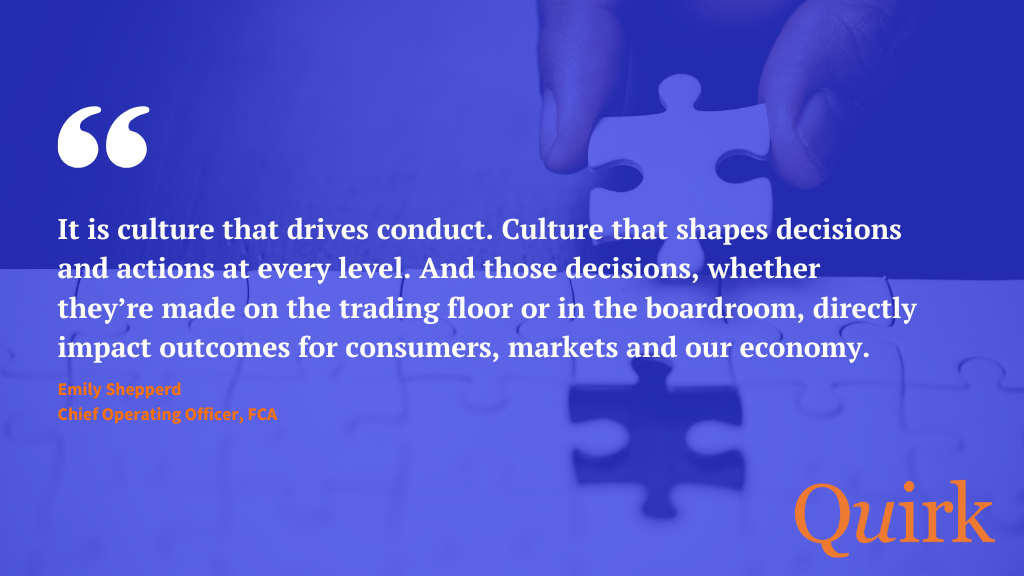On 4 Feb 2025, Emily Shepperd, the COO of the Financial Conduct Authority (FCA), gave a speech to the 10th Annual Culture and Conduct in the Financial Services Sector, entitled ‘Culture is Contagious’, which set out the clear intent for the FCA development of its rules and guidance around culture. She stressed that, “culture drives conduct and decision-making, which directly impact outcomes for consumers, markets, and our economy. For this reason, culture will continue to be a regulatory concern”.
There have been ripples for some time that the FCA is going to look to update its rules and guidance on non-financial misconduct. Emily’s speech talks about how poor culture is the number one root cause in what leads from early stage poor behaviours such as bullying and harassment, to more major failings in market conduct and consumer protection.

The speech reinforces some particularly pertinent points:
- A focus on promoting or establishing a healthy culture is not at odds with pushing for risk and growth, it enhances it, providing a competitive advantage and long-term resilience
- Toxic cultures play a key part in non-financial misconduct in the sector
- Culture is like immunity, it needs to be actively maintained
The Financial Advantages of a Focus on Culture
An increased drive in board and shareholder-level focus on creating and maintaining a healthy organisational culture looks inevitable, and likely to be strengthened in regulatory terms. Regardless of whether the regulations are in place or not, boards and senior leaders should be starting to look at their culture and how it can be developed to improve metrics at all levels – financial and non-financial, because it has an impact on their financial performance.
Enabling growth requires risk-taking, but getting the right level of risk tolerance within a highly regulated framework, whilst mitigating against abuse, requires a robust culture where people feel safe to raise concerns about behaviours, and empowered to make decisions at the lowest possible level. Avoiding group-think and creating the right practices in dealing with failures are critical in creating a team that is able to maintain levels of conduct and performance intrinsically, rather than purely procedurally.
Constructive criticism and learning from failures are theoretically simple, but any senior leader will know that if you are in an organisational culture that doesn’t already embrace them, they can be fiendishly difficult to embed.
Toxic Cultures and Misconduct
As per the speech, most major non-financial misconduct will be rooted somewhere in a toxic culture – more minor incidents, be it of bullying, harassment or discrimination, have been dealt with poorly, or not at all. The behaviour is contagious and usually the culture means that even those that have nothing to do with it are effectively complicit in their silence.
Often the senior leadership/board of an organisation will have done some work on how they want the culture to be and ensuring everyone is told – someone has workshopped a ‘Company Values’ statement, made sure the DEI policy is re-circulated, and Internal Comms have turned the Values into a giant lobby wall sticker. Job done and everyone moves on. Even where people really believe in it at the top, whether or not these values and the intent translate into the actual, living-breathing culture of the organisation depend entirely on how everyone, but especially leaders, at all levels behave.
This requires intentional, deep-rooted embedding mechanisms, and those are not a one-size fits all solution, they need to be tailored to the particular culture that already exists and the one you want to achieve.
Growth, Culture and Mergers &Acquisitions (M&A)
The FCA focus on supporting the Government agenda around growth also has important implications specific to culture. Growth, whether it is organic or through M&A, is a frequent pain point for organisational culture. However strong and well-established the existing baseline, as more people enter the organisation, teams grow and leaders step up the numbers within their line management chains, people and processes are stretched in ways that fundamentally alter the internal dynamics. Proactively planning for how you will maintain your culture during periods of growth and/or actively considering culture as part of your M&A strategy, will help smooth integration times and improve outcomes.
Cultural Maintenance – tend it like a garden
Even once you reach the dizzying heights of cultural excellence – everyone is empowered, innovating, behaving appropriately – culture is something that rarely stays static. As each new generation of leaders rise, as each market-reactive or new regulatory development occurs, subtle shifts can undermine the good work done. How does your organisation consciously work towards maintaining and continuing to actively develop a healthy culture?
So What?
If your firm is in the financial sector, the FCA cares about your culture, even if you do not. For a similar reason, your shareholders and customers likely will also be interested, as it is the underpinning of your offering and operational activities and is ignored at a firm’s peril. The first step is understanding where you are currently – this is not the same as doing an employee engagement survey. Establishing a qualitative and quantitative baseline helps understand where you are now and where you would like to get to. Subsequently working out how to get from A to B, and the right pathway for your organisation – this usually requires a bit of time and deeper working with people than just sending everyone on a training course or doing a one-off away day (though these things usually help). Lastly, having that baseline assessment gives you something to measure progress against, and enables you to understand how your culture is developing.
We have all seen repeatedly how the FCA likes to see a preventative approach and a plan of action. Whether you are interested in culture because you see the value in the financial and behavioural aspects of it, or because you are looking to get upstream of the FCA guidance, mapping your organisational culture and being able to demonstrate a proactive plan of action could become important factors in preventing and defending against misconduct cases.
You can view the full speech here: Culture is contagious | FCA
If you would like to speak to Quirk about getting an initial culture diagnostic to see where your organisation currently sits, then please get in touch through [email protected]



